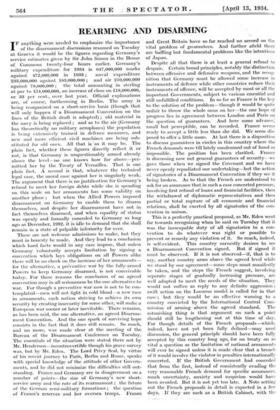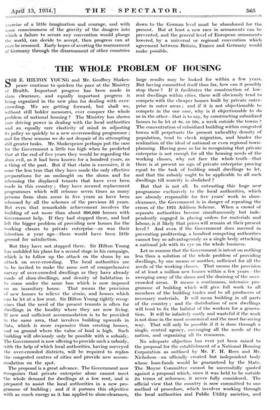REARMING AND DISARMING
IF anything were needed to emphasize the importance of the disarmament discussions resumed on Tuesday at Geneva it would be the figures regarding Germany's service estimates given by Sir John Simon in the House of Commons twenty-four hours earlier. Germany's military expenditure for 1934 . is 647,000,000 marks against 472,000,000 in 1933; naval expenditure 233,000,000 against 183,000,000; and air 210,000,000 against 78,000,000; the total amounting in sterling at par to /54,000,000, an increase of close on 118,000,000, or 33 per cent., over last year. Official explanations are, of course, forthcoming in Berlin. The army is being reorganized on a short-service basis (though that will only happen if a Disarmament Convention on the lines of the British draft is adopted) ; old material in the navy is being replaced ; and as to the air (Germany has theoretically no military aeroplanes) the population is being extensively trained in defence measures, and new and more efficient •civil machines are being sub- stituted for old ones. All that is 'as it may be. The plain fact, whether these figures directly reflect it or not, is that Germany is unquestionably armed already above the level—no one knows how far above—per- mitted her by the Treaty of Versailles. That is one plain fact. A second is that, whatever the technical legal case, the moral case against her is singularly weak. The argument that there is no justification for Germany's refusal to meet her foreign debts while she is spending on this scale on her armaments has some validity on another plane ; but when the Allied powers iinposed disarmament on Germany to enable them to disarni themselves, and despite her disarmament have not in fact themselves disarmed, and when equality of status was openly and formally conceded to Germany as long ago as December, 1932, it is idle to demand that she shall remain in a state of palpable inferiority for ever.
These are not welcome admissions to make, but they must in honesty be made. And they lead to a conclusion which hard facts would in any case impose, that unless Germany voluntarily accepts limitation by signing a convention which lays obligations on all Powers alike there will be no check on the increase of her armaments— for the alternative, a preventive war by the fully-armed *Powers to keep Germany disarmed, is not conceivable today. For those reasons the conclusion of an agreed convention may in all seriousness be the one alternative to war. For though a preventive war now is not to be con- templated—men will not fight in cold blood—a new race in armaments, each nation striving to achieve its own security by creating insecurity for some other, will make a European war sooner or later inevitable. There remains, as has been said, the one alternative, an agreed Disarma- ment Convention. And the one spark of surviving hope consists in the fact that it does still remain. So much, and no more, was made clear at the meeting of the Bureau of the Disarmament Conference on Tuesday. The essentials of the situation were stated there not by Mr. Henderson—incontrovertible though his grave survey was, but by Mr. Eden. The Lord Privy Seal, by virtue of his recent journey to Paris, Berlin and Rome, speaks with special knowledge of the attitude of other Govern- ments, and he did not minimize the difficulties still out- standing. France and Germany are in disagreement on a number of points—the size of Germany's new short- service army and the rate of its rearmament ; the future of the German semi-military formations ; the question of France's reserves • and her °verses. troops. France and Great Britain have so far reached no accord on the vital problem of guarantees. And farther afield there are baffling but fundamental problems like the intentions of Japan.
Despite all that there is at least a general refusal to despair. Certain broad principles, notably the distinction between offensive and defensive weapons, and the recog- nition that Germany must be allowed some increase in instruments of defence while other countries reduce their instruments of offence, will be accepted by most or all the important Governments, subject to various essential and still unfulfilled conditions. In so far as France is the key to the solution of the problem—though it would be quite unfair to throw the whole onus on her—the one hope of progress lies in agreement between London and Paris on the question of guarantees. And here some advance; small but perceptible, can be recorded. France seems ready to accept a little less than she did. We seem dis-: posed to offer a little more. At last there is a disposition to discuss guarantees in circles in this country where the French demands were till lately condemned out of hand as impossible. The position has been clarified. France is discussing now not general guarantees of security—we gave those when we signed the Covenant and we have never openly repudiated our undertaking—but the action of signatories of a Disarmament Convention if they see it being broken. As to that the French are understood to ask for an assurance that in such a case concerted pressure, involving first refusal of loans and financial facilities, then the withdrawal of diplomatic representatives and then partial or total rupture of all economic and financial relations, shall be exerted by all signatories of the con- vention in unison.
This is a perfectly practical proposal, as Mr. Eden went far towards recognizing when he said on Tuesday that it was the inescapable duty of all signatories to a con- vention to do whatever was right or possible to prevent or remedy any violation of it. So much, indeed, is self-evident. This country earnestly desires to see a Disarmament Convention signed. But if signed it must be observed. If it is not observed—if, that is to say, another country arms above the agreed level while WC stand by our agreement—some steps must manifestly be taken, and the steps the French suggest, involving separate stages of gradually increasing pressure, are well adapted to meet the needs of the situation. They would not suffice as reply to any definite aggression ; swift action on the Loearno model is called for in that case ; but they would be an effective warning to a country convicted by the International Central Com- mission of arming above the agreed standard. The astonishing thing is that argument on such a point should still be lengthening out at this time of day. For though details of the French proposals—which, indeed, have not yet been fully defined—may need discussion, the general principle should have been fully accepted by this country long ago, for no treaty on so vital a question as the limitation of national armaments will ever be signed unless it is made clear that a breach of it would involve the violator in penalties internationally concerted. If the British Government had conceded that from the first,. instead of consistently evading the very reasonable French demand for specific assurances, much uncertainty, anxiety and suspicion would have been avoided. But it is not yet too late. A Note setting out the French proposals in detail is expected in a few days. If they are such as a British Cabinet, with the exercise of a little imagination and courage, and with some consciousness of the gravity of the dangers into which a failure to secure any convention would plunge the world, can decide to accept, then progress can at once be resumed. Early hopes of averting the rearmament of Germany through the disarmament of other countries down to the German level must be abandoned for the present. But at least a new race in armaments can be prevented, and the general level of European armaments lowered, by a universal or regional convention which agreement between Britain, France and Germany would make possible.

















































 Previous page
Previous page